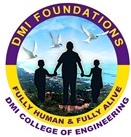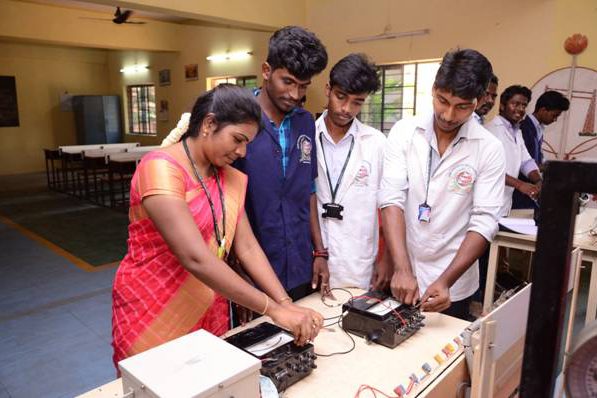Vision
To build Excelling Electrical Engineers with technical, interpersonal skills and ethical values.
Missions Of The Department
- To impart quality technical education with high proficiency and provide a platform to apply the acquired knowledge.
- To impart the practise of continual – erudition, evaluation and improvement of the self in technical and interpersonal skills.
- To nurture the talent and to facilitate the students with all round expertise and strong ethical values to make a positive difference to the society through education.
The Educational Objectives of the Electrical and Electronics Engineering (EEE) Programme represent major accomplishments that we expect our graduates to achieve after three to five years of graduation. More specifically our graduates are expected:
PEO1. Engineering Competency:
Graduates will have fundamental and broad knowledge in Electrical Science relating to industrial application and research to design, analyse and synthesize information from various sources and think differently to provide solutions to their discipline.
PEO2. Entrepreneurship In Core Skills:
Graduates will become entrepreneurs, employees of reputed organizations, pursue higher studies and research for developing advanced skills in Electrical and Electronics Engineering.
PEO3. Competent Learning:
Graduates will exhibit technical and intellectual competency and will be amenable for life-long learning.
PEO4. Moral Values:
Graduates will demonstrate technical knowledge and ethical values for professional development to meet the societal needs.
PEO5. Real-Time Solutions:
Graduates will be able to work in multi-disciplinary environment by providing solutions to real time problems.
Apply the knowledge of mathematics, science, engineering fundamentals and an engineering specialization to the solution of the complex engineering problems.
PO2: Problem Analysis:
Identify formulate, Review research literature and analyze complex engineering problems.
PO3: Design development of solutions:
Design the solutions for complex engineering problem and design system components or processes that meet the specified needs with appropriate considerations for the public health and safety and cultural and societal and environmental considerations.
PO4: Conduct Investigations of Complex Problem:
Use research based knowledge and research method including design of experiments, analysis and interpretation of data and synthesis of information to provide valid conclusions.
PO5: Modern Tool Usage:
Create, Select and Apply appropriate techniques, resources, modern engineering and IT tools including prediction and modeling to complex engineering activities with understanding of the limitations.
PO6: Engineer and Society:
Apply reasoning informed by contextual knowledge, to assess societal health, safety, legal and cultural issues and consequent responsibility relevant to professional engineering practices.
PO7: Environment and Sustainability:
Understand the impact of professional engineering solution in societal and environmental context and demonstrate the knowledge of =, and need for sustainable development.
PO8: Ethics:
Apply ethical principles and commit to professional ethics and responsibilities and norms of engineering practices.
PO9: Individual and Team Work:
Function effectively as an individual and as a member or leader in diversity and multi-disciplinary settings.
PO10: Communications:
Communicate effectively on complex engineering activities with the engineering community and with society at large such as being able to comprehend and write effective reports and design documentations, make effective presentations and view and receive clear instructions.
PO11: Project Management and Finance:
Demonstrate knowledge and understanding of the engineering and management principles and apply these to one’s own work, as a member and leader in a team to manage project and in multi-disciplinary environments.
PO12: Life long learning:
Recognize the need for and have the preparation and ability to engage in independent and life long learning in the broadest context of technological change.
Electrical and Electronics Engineering Graduates will be able to:
PSO1:
Apply the fundamentals of mathematics, science and engineering knowledge to identify, formulate, design and investigate complex engineering problems of electric circuits, analog and digital electronic circuits, electrical machines and power systems.
PSO2:
Apply appropriate techniques and modern Engineering hardware and software tools in power systems to engage in life- long learning and to successfully adapt in multi disciplinary environments.
PSO3:
Understand the impact of Professional Engineering solutions in societal and environmental context, commit to professional ethics and communicate effectively.



